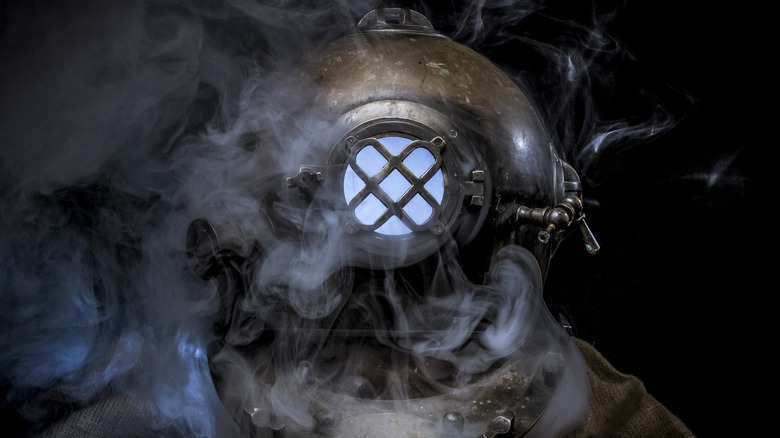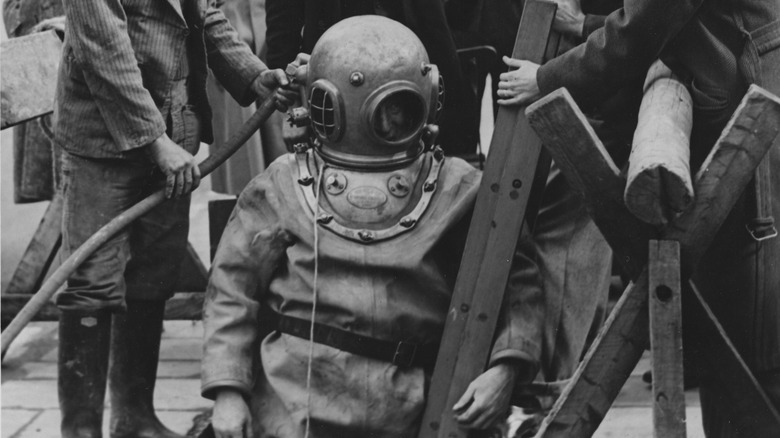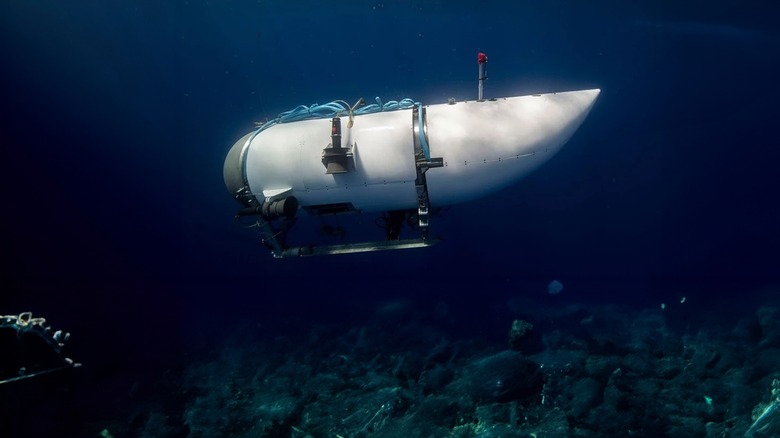What Happens To The Body During An Implosion?
With the recent destruction of OceanGate's Titan submersible fresh in the minds of the public, many people are curious about what the deceased experienced in the final moments of their trip. OceanGate CEO Stockton Rush, owner of Action Aviation Hamish Harding, Pakistani businessman Shahzada Dawood and his son Sulemon, and French explorer Paul-Henri Nargeolet all died under horrific circumstances when the Titan suffered a "catastrophic implosion." The event occurred sometime after descending to pay the sunken Titanic a visit on Sunday, June 18. As CNN noted in a report, an unmanned vehicle found debris from the Titan — including its tail end — about 1,600 feet from the wreckage of the Titanic. In another CNN report, the outlet noted that U.S. Coast Guard investigators are working to retrieve the debris as part of their probe.
The remnants of the Titan sit about 12,500 feet below the surface. To put things in perspective, this is deeper than nine Empire State Buildings stacked on top of each other. At that depth, water pressure crumples a human body — except for the bones — and crushes any submersible that has a crack or defect. If a submersible implodes into a human body, there's not much chance of finding any remains, ecologist Nicolai Roterman explained to NBC News. The deceased would have died instantly and "known nothing" as their bodies were subjected to pressure equal to the weight of the Eiffel Tower.
Compressed in the depths
Anyone who has ever dove underwater to the bottom of a pool or taken part in scuba diving can attest to the pressure that water places on the body. Even at shallow depths, you can feel the difference in your lungs, your head, your ears, and more. As Dive Deep Scuba says, the limit for recreational, non-beginner scuba diving is about 130 feet — a sliver of the depth that OceanGate's destroyed Titan submersible descended. Additionally, this is without wearing a special deep-diving suit to keep you alive at the lower depths. Go lower and you'll suffer decompression sickness when returning to the surface (also known as "the bends"), a condition that results in headaches, dizziness, numbness, joint pain, an inability to concentrate, and more.
Scientific American says that for every 33 feet you go underwater, the pressure on the body increases by 15 pounds per square inch (psi). Sunlight cuts out at 656 feet deep, or 298 psi. Rottweiler bites equal 328 psi, per Ruffle Snuffle. Crocodile bites measure up to 3,700 psi. A great white shark can bite up to 4,000 psi. Where the Titanic rests underwater, pressure pushes in at an incessant 5,500 to 6,000 psi. All of that pressure was pushing on the Titan when it imploded, as well as each of the individuals inside — every single square inch of their bodies all at once. Framed in terms of weight, NBC News calls that "high thousands of tons to 10,000 tons" pressing down.
The implosion was an unsurvivable event
For those with either a morbid sense of curiosity or high tolerance to gruesome imagery, Newsweek reported on a 2009 "Mythbusters" episode that demonstrated what happens to a human body subjected to deep-sea diving pressure high enough to cause an implosion. The Season 7, Episode 19 experiment saw "a human-shaped dummy made of pig parts with bones, muscle, fat, skin and midsection of guts" stuffed into a deep-sea diving suit. The video — viewable in full on YouTube and reposted on Twitter and elsewhere — shows a popping, spurting mass of red flooding the diving helmet as the dummy's suit is depressurized. It might go without saying, but no one could survive such pressure. The only catch? That dummy was only 300 feet deep — not 12,500 feet deep, which is where the Titan lies in pieces.
Professor of marine autonomy Blair Thornton told NBC News that it wouldn't even take some large, visible crack to make a submersible implode at the depths of the Titanic. Surprisingly, it would only take minuscule or even microscopic defects. "The air inside would compress down to a point, and the forces of the water rushing in and the collapse would be enormous," he told the source. He continued to say that it would be as if the crew winked away in "the blink of an eyelid." That means those on board didn't know what happened or suffer. Such statements, however, are unlikely to provide comfort to the victims' loved ones.


